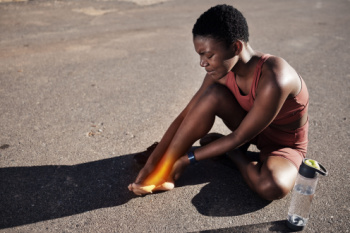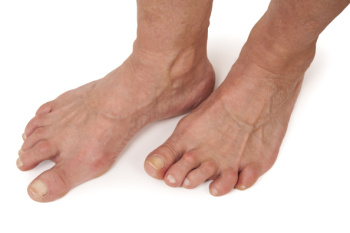Connect With Us
Blog

Feet work hard every day, so it is no surprise that they are prone to a variety of issues. Some of the most common foot problems include bunions, which cause a painful bump at the base of the big toe, and plantar fasciitis, a leading cause of heel pain. Flat feet, high arches, and hammertoes can also lead to discomfort and imbalance. Corns, calluses, and ingrown toenails are often caused by pressure or wearing poor-fitting shoes. Fungal infections like athlete’s foot or toenail fungus are also common, especially in damp environments. Overuse, aging, and medical conditions such as diabetes or arthritis can contribute to or worsen these issues. While some problems may improve with simple changes in footwear or home care, persistent pain or changes in the appearance of the feet should not be ignored, and it is suggested that you see a podiatrist.
Foot Pain
Foot pain can be extremely painful and debilitating. If you have a foot pain, consult with Josef Elouze, DPM from Elite Podiatry. Our doctor will assess your condition and provide you with quality foot and ankle treatment.
Causes
Foot pain is a very broad condition that could be caused by one or more ailments. The most common include:
- Bunions
- Hammertoes
- Plantar Fasciitis
- Bone Spurs
- Corns
- Tarsal Tunnel Syndrome
- Ingrown Toenails
- Arthritis (such as Gout, Rheumatoid, and Osteoarthritis)
- Flat Feet
- Injury (from stress fractures, broken toe, foot, ankle, Achilles tendon ruptures, and sprains)
- And more
Diagnosis
To figure out the cause of foot pain, podiatrists utilize several different methods. This can range from simple visual inspections and sensation tests to X-rays and MRI scans. Prior medical history, family medical history, and any recent physical traumatic events will all be taken into consideration for a proper diagnosis.
Treatment
Treatment depends upon the cause of the foot pain. Whether it is resting, staying off the foot, or having surgery; podiatrists have a number of treatment options available for foot pain.
If you have any questions, please feel free to contact our office located in (Holiday City) Toms River, NJ . We offer the newest diagnostic and treatment technologies for all your foot care needs.

Rheumatoid arthritis in the feet can lead to a range of symptoms that affect daily movement and comfort. This autoimmune condition often targets the metatarsophalangeal, or MTP, joint, along with joints in the toes, resulting in pain, stiffness, and swelling. Over time, such joint damage can alter foot structure, causing the arches to collapse and leading to flat feet. The shifting alignment of the toes may also contribute to the development of bunions and hammertoes. As pressure points change, thickened skin such as calluses may form on the soles or sides of the feet. These symptoms can make walking painful and reduce stability. Early recognition of these signs is essential for managing rheumatoid arthritis. If you are experiencing any of the above symptoms, it is suggested that you are under the care of a podiatrist who can help you to manage this serious and painful condition.
Because RA affects more than just your joints, including the joints in your feet and ankles, it is important to seek early diagnosis from your podiatrist if you feel like the pain in your feet might be caused by RA. For more information, contact Josef Elouze, DPM of Elite Podiatry. Our doctor will assist you with all of your podiatric concerns.
What Is Rheumatoid Arthritis?
Rheumatoid Arthritis (RA) is an autoimmune disorder in which the body’s own immune system attacks the membranes surrounding the joints. Inflammation of the lining and eventually the destruction of the joint’s cartilage and bone occur, causing severe pain and immobility.
Rheumatoid Arthritis of the Feet
Although RA usually attacks multiple bones and joints throughout the entire body, almost 90 percent of cases result in pain in the foot or ankle area.
Symptoms
- Swelling and pain in the feet
- Stiffness in the feet
- Pain on the ball or sole of feet
- Joint shift and deformation
Diagnosis
Quick diagnosis of RA in the feet is important so that the podiatrist can treat the area effectively. Your doctor will ask you about your medical history, occupation, and lifestyle to determine the origin of the condition. Rheumatoid Factor tests help to determine if someone is affected by the disease.
If you have any questions please feel free to contact our office located in (Holiday City) Toms River, NJ . We offer the newest diagnostic and treatment technologies for all your foot and ankle needs.

Middle-aged pickleball players are finding themselves sidelined by overuse injuries as the sport’s popularity surges. While the fast pace and fun atmosphere attract players in their 40s, 50s, and beyond, repetitive movements can take a toll on joints, tendons, and muscles. Common injuries include tennis elbow, shoulder strain, Achilles tendonitis, and plantar fasciitis, often caused by poor form, wearing improper footwear, or skipping warmups. Many players do not realize that frequent play without recovery increases the risk of chronic pain. Courts are packed with players who have not played sports in years, and their bodies are adjusting under pressure. Listening to your body, resting when sore, and adding strength and flexibility exercises can go a long way. If pain persists or interferes with play, it is smart to seek professional care. It is suggested that you see a podiatrist who can evaluate foot and ankle health and help prevent small problems from turning into long-term injuries.
Ankle and foot injuries are common among athletes and in many sports. They can be caused by several problems and may be potentially serious. If you are feeling pain or think you were injured in a sporting event or when exercising, consult with Josef Elouze, DPM from Elite Podiatry. Our doctor will assess your condition and provide you with quality foot and ankle treatment.
Common Injuries
The most common injuries that occur in sporting activities include:
- Achilles Tendonitis
- Achilles Tendon Rupture
- Ankle Sprains
- Broken Foot
- Plantar Fasciitis
- Stress Fractures
- Turf Toe
Symptoms
Symptoms vary depending upon the injury and in some cases, there may be no symptoms at all. However, in most cases, some form of symptom is experienced. Pain, aching, burning, bruising, tenderness, tightness or stiffness, sensation loss, difficulty moving, and swelling are the most common symptoms.
Treatment
Just as symptoms vary depending upon the injury, so do treatment options. A common treatment method is known as the RICE method. This method involves rest, applying ice, compression and elevating the afflicted foot or ankle. If the injury appears to be more serious, surgery might be required, such as arthroscopic or reconstructive surgery. Lastly, rehabilitation or therapy might be needed to gain full functionality in the afflicted area. Any discomfort experienced by an athlete must be evaluated by a licensed, reputable medical professional.
If you have any questions, please feel free to contact our office located in (Holiday City) Toms River, NJ . We offer the newest diagnostic and treatment technologies for all your foot care needs.


